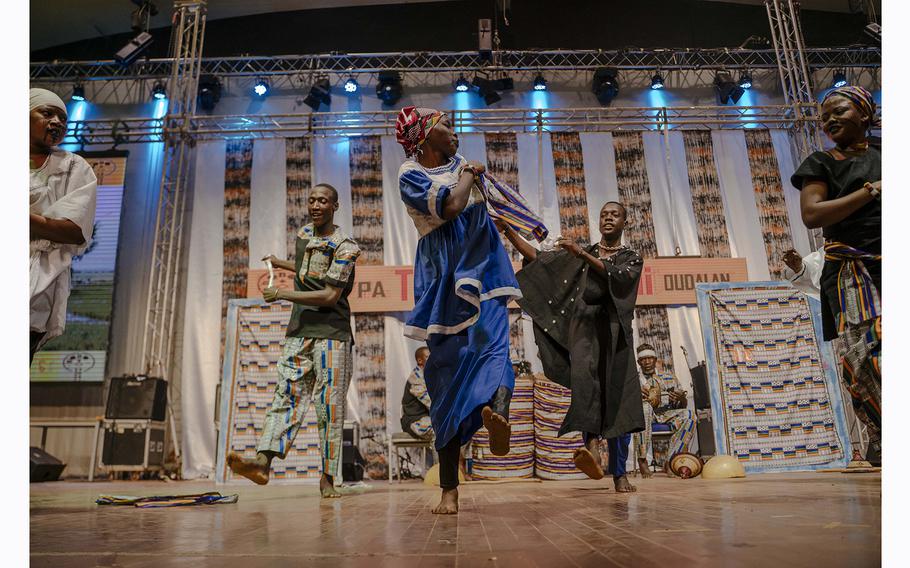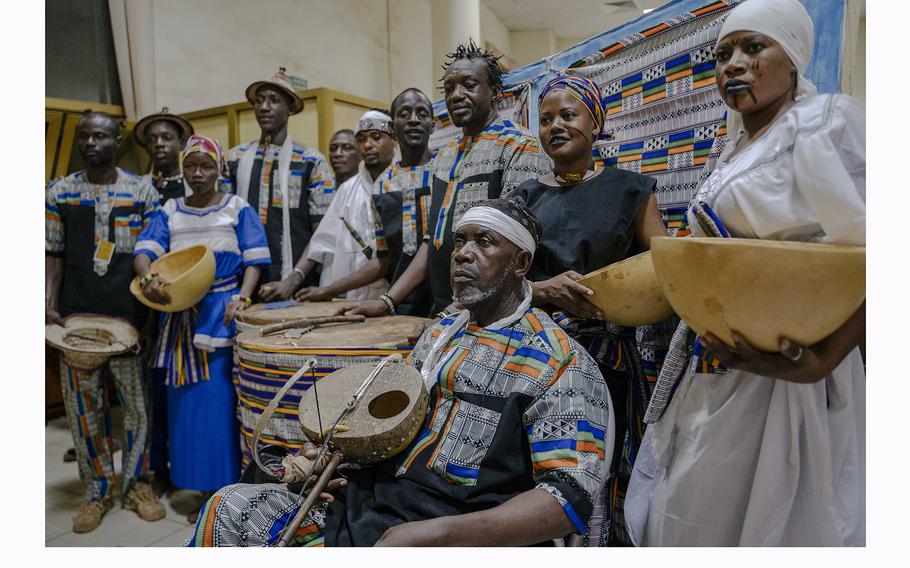
Members of the traditional dance troupe from Burkina Faso’s Sahel region perform at a national competition in Bobo-Dioulasso on April 30, 2024. (Carmen Yasmine Abd Ali for The Washington Post)
BOBO-DIOULASSO, Burkina Faso - The musicians and dancers traveled in a military convoy to reach the competition, moving in armored cars with soldiers at the ready through parts of the country where Islamist extremists have banned their violins, drums and dance moves.
There was a dancer whose close friend had been killed for listening to a radio while he farmed. A violinist who no longer dared to play at the marriages and baptisms in the villages where he used to make his living. A young dancer who could no longer go to concerts with her friends in neighboring villages.
The traditional dance troupe members had journeyed from Burkina Faso’s Sahel province, one of the most dangerous areas in a country racked in recent years by violence committed by Islamist extremists. At this national festival, the troupe would face off against teams from across Burkina Faso. At stake was pride and money. For the Sahel team, it was also about resistance.
“In the villages now, you cannot play music on your phones or have even a little instrument,” said Amadou Ag Anasbagort, 36, whose friend was killed by the militants a few years ago after he was caught listening to his radio. “So when we are here dancing, we are happy. It is like we have a bit of power.”
Backstage this past Tuesday, just ahead of their big performance, Ag Anasbagort helped his fellow dancer tie an ill-fitting traditional dress. Team leader Altiné Hassane sweated as he covered the base of a goumbé drum in traditional fabric, hoping for style points to boost their score. They discovered that the flute player had left his instrument behind but agreed that the show must go on.
As the dancers and musicians filed into a narrow hallway, listening to the beat of drums from the group before them, a handful of leaders from their region arrived, giving fist bumps and last-minute pep talks.
“Today is the day,” said Ibrahim Maiga, a local official who moved from his hometown in the Sahel region to the capital years ago, concerned about being kidnapped by Islamist militants.
“Explode, explode, explode!” Maiga said, his voice rising in excitement as the artists smiled and nodded, their eyes fixed on the entryway to the stage. “Have no fear.”
By helicopter and convoy
Before Islamist extremists began seizing vast swaths of territory, this nation of 23 million, which was called the Republic of Upper Volta until 1984, was known for its international film festival and its former president, Thomas Sankara, who was a well-known advocate of pan-Africanism before his assassination.
Burkina’s Sahel region, adjacent to the border with Mali and Niger, was a destination for tourists traveling to northern Mali, said Bamogo Amidou Paul, the region’s director for culture and tourism. But that tourism dried up, he said, as soon as violence began spilling over the border with Mali around 2015.
“Culture has also suffered with the terrorism,” he said. “But culture evolves with men, since even when men are displaced, their culture comes with them.”
The week-long festival in Bobo-Dioulasso, typically held every two years, is intended to promote the diversity of cultures across Burkina Faso’s 13 regions, celebrating everything from traditional dance to wrestling to cooking, with competitions, fairs and exhibitions.

Members of the Sahel team backstage. The week-long festival, typically held every two years, is intended to promote the diversity of cultures across Burkina Faso’s 13 regions, celebrating everything from traditional dance to wrestling to cooking. (Carmen Yasmine Abd Ali for The Washington Post)
For years, the team from the Sahel region did not have the funding to compete, said Hassane, the dance team leader, because the local economy had been battered by the violence. But last year, the government brought the troupe in by helicopter. This year, they used a convoy.
On the eve of their departure for the festival, parents of five dancers learned they would be traveling by road and pulled their children out, Hassane said. The parents were afraid of explosives and attacks.
Joy for the community
Hours before showtime, sweat was starting to glisten on the dancers’ faces as the sun set on a humid evening at the stadium where they were practicing. They made sure the tension of the drum was just right and reminded each other not to look at their feet as they danced, but to smile.
Inamoud Cissé, a violin player, said he hoped that their performance would be a symbol of unity. The song and dance included music and moves from three main ethnicities in the region, Songhai, Fulani and Tuareg, which had seen their divisions deepen because of the violence.
“Playing music does not just give me joy but gives hope to the whole community,” said Cissé, who fled his village five years ago, after militants stole his cows and sheep and killed eight members of his extended family. “We want to show that we can be together - that despite our problems, we can keep living together.”
He can play his violin in Dori, the town where he now lives, but does not dare go outside with his instrument, which radical Islamists consider haram, or forbidden. And in Dori, he said, he carries the violin above his head, worried that if it is in a bag, soldiers and militia members will mistake it for a gun.
Ag Anasbagort, who sells grilled chicken at the markets that remain open, said that the violence has waned in towns since the arrival of volunteer militiamen in recent years but that the countryside remains dangerous. But still, Ag Anasbagort, who said his motorcycle was once blown up by Islamist militants, lives in fear.
When he arrived in Bobo-Dioulasso, he headed straight to the hair dresser for extensions, wanting to sport orange dreads that he would be too scared to wear at home and now represented a bit of freedom.
Aïssatou Maiga, 24, whose cousin was last year killed by militants when he refused to join them, said she never hesitated when thinking about the nearly 400-mile journey from the Sahel region to the festival.
“Because when I am dancing,” she said, “it is the only time I am at ease.”
Dancers dropped it low
The auditorium was packed for their performance. Hassane and Cissé kicked things off, the sounds of their drum and violin filling the room. Then the dancers filed onto the stage, led by Ag Anasbagort and Maiga.
Their traditional outfits and the composition of the song were meant to honor different ethnic groups. The first part of the song was a celebration of a Fulani dance. The audience clapped as the dancers dropped it low into a squat, the women holding calabashes used for serving bowls.
Maiga, the local official, was on his knees in front of the stage, head nodding to the beat as he watched the clock, willing the dancers not to stumble and the team not to go over the 15-minute limit, as it had done the year before, leading to its disqualification.
The men lifted the women above their heads, then somersaulted forward on the stage, beginning a shoulder-shimmying routine to honor Songhai, then Tuareg dance. As the beat picked up, the audience’s claps turned to increasingly raucous cheers.
“They must win,” said one audience member, turning to a journalist.
“Despite all our problems,” said Maiga, “this is what social cohesion looks like.”
The team would not find out if it won for days - sadly, it didn’t - but its members said they weren’t nervous that night. Instead they said they were proud to be there, thinking only of the music as they sashayed to its rhythm and trying to remember the instructions to look up and smile.